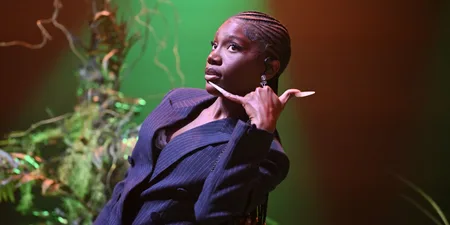Ghetts is winning right now and it’s so good to see
On “Pick Up the Phone”, a track featured on his latest release Ghetto Gospel: The New Testament, he spits: “Every time I answer my phone it’s money on the other end these days.” But it wasn’t always this way.
In and out of prison throughout his teens, there were times in Ghetts’ life where the idea of being offered a bag at every corner seemed so far out of reach that a trip to the moon with E.T. in tow probably felt more realistic. In his eyes his future looked unlikely to have a happy ending.
But that all changed.
According to Ghetts himself, grime music and its culture saved his life. In an interview with The 405 he claimed: “Without grime I was lost and I was just doing silly stuff. I feel like when I came across the grime scene I had direction, I had something to do where I could focus my energy.”
Continuing to support and represent a genre that was once considered the bad apple of the British batch by mainstream media, Ghetts is now reaping the benefits of his loyalty.
“It’s crazy but I saw it coming,” he tells us backstage at this year’s Reading Festival. “I’m just happy to be a part of it and I’m glad I stuck it out through the times when we weren’t doing Reading Festival and we weren’t doing all these other festivals.”
This year’s Reading Festival caused a bit of a stir online when a lot of “old heads” criticised the lineup for not featuring enough rock bands. It’s a topic discussed every year but for some reason 2018 saw it get more traction than usual, which probably had a lot to do with the fact that it was a very grime-heavy lineup.
But that makes sense. When grime music is what best represents British youth culture and is what we as a nation are currently being celebrated for then that’s what festivals should be pushing. Sure, there should always be a balance but no one complained when festivals were littered with indie bands during the late 90s/early 2000s indie boom.
Of course Ghetts sides with Britain’s youth but he also understands why those who criticised Reading’s lineup did so, admitting that he might one day find himself in the same frame of mind.
“For adults that have been into a genre for a very long time it gets to that point eventually,” he explains. “Like when I get older I might be like, ‘What the fuck are these kids listening to? What is this shit?’ No adult has ever won that argument because the times change.
“The cycle will always continue and how you win is just by understanding music. One thing I always tell myself is that music is a vibe, it’s a whole new language on its own and sometimes things just aren’t gonna connect with you, but it’s a vibe. If the vibe works it works.”
Making music is a therapy session for Ghetts and because of that it’s no surprise to learn that one of his favourite artists growing up, and one that inspired him musically, was 2Pac.
“2Pac is a legendary, legendary, legendary artist,” he says with gritted teeth and a raised brow. Taking a second to adjust the Supreme ski goggles he’s proudly sporting sideways, he continues:
“The emotion he conveyed was incredible. I mostly prefer artists with substance in their music because it stands the test of time. Don’t get me wrong though, I enjoy a club tune like the next man does, when I’m in a club. But for me there’s just something special about a tune you can relate to, especially when you’re going through some shit, and in that time or in that moment you live with it and it touches you differently.”
Taking inspiration from the emotion 2Pac conveyed and channeling it through his own music, Ghetts’ latest release, Ghetto Gospel: The New Testament is deep. It’s DMX “Prayer” deep. It’s very different to what the commercial masses have come to expect from him and that’s exactly the point.
“When I was 21 I made an album called Ghetto Gospel,” he begins. “It was a very conceptual piece, a very vulnerable piece in terms of subject matter and what we were talking about at that time compared to what other rappers were talking about at the time.
“It’s something I felt went over people’s heads because there was no social media so for reactions I was going off of my surroundings. I didn’t know whether it was reaching people of a different demographic, a different type of person from a different walk of life or not. So I guess I kinda conformed to the norm for a little while making what I thought worked.”
Then in January last year Ghetts celebrated 10 years since the release of Ghetto Gospel at London’s Roundhouse. If there was any self-doubt about doing the show he was convinced in the end by the fans who sent countless tweets telling him it was his best body of work.
“We sold out,” he says still shocked that he was able to do that. “It was amazing for me to see because before that I had my doubts. But on the night, because I had never gotten to perform the mellow songs before in my sets over the years, I found out how much they touched people.”
The praise that came to light following the Roundhouse show that extinguished his own self-doubt influenced Ghetts’ creative process moving forward and inspired his most recent release.
“When I went back into the studio to make new music I was [making deeper songs] naturally. It was the first time I didn’t have a name for my album before I started work on it – usually I have the name first and write conceptually around the album. So I had song after song after song and after I got a collection of songs together and listened to them I felt like it was a Ghetto Gospel part two, it felt natural. So I called it Ghetto Gospel: New Testament.”
Currently promoting both his new album and his acting debut in the movie The Intent 2: The Come Up, Ghetts plays Jay in the prequel to 2016’s The Intent. Not intentionally vying for a career in acting, it just happened, or so that’s how Ghetts tells it.
“That came about in a weird way to be fair,” he admits. “I was meant to be doing the soundtrack for the movie, I wasn’t meant to be acting in it but I kept being asked if I wanted to be in it, which was something I’d never really thought about before.
“Then I was asked if I wanted to have the lead role, which is something you just can’t turn down, and so I went to an audition where people didn’t know me as Ghetts and so when I got the role I didn’t feel like it was a biased decision, I felt like I was actually right for the role.”
So does he have the acting bug now?
“I really have. But people don’t realise how hard it is. It was a lot for me because at least with music when you do a video and you’re spitting to camera you can watch the playback. In film there’s none of that so I had to adapt. Cold days, cold nights and rain but because you’re acting you’ve got to stick it out. But when it was finished and I could see different scenes it was like, ‘Wow, it was really worth it.'”
Before letting him run off to answer the phone for that next bag we had to discuss “that” Drake photo.
Meeting Drake backstage at this year’s Wireless Festival, Ghetts says it was actually Drake who initiated the meet that led to a photograph of the pair going viral.
“It was pretty natural,” he explains. “People like to say he’s this and that but credit to the guy, he saw me from across the way and even with security he went out of his way to come and say hello to me and that speaks volumes about his character, even in knowing who I am and coming to speak to me about the music. I felt a genuine love for the culture from him.”
Ghetts’ new album Ghetto Gospel: The New Testament is out now.











































